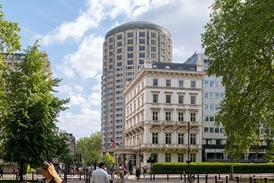Does Michael Gove’s decision signal a clear change in government policy, or does it just presage more uncertainty, asks Ben Flatman

After months of delay, Michael Gove has decided to reject the planning inspector’s recommendation and refuse M&S’s application to demolish its Marble Arch store on Oxford Street. It’s a triumphant moment for SAVE Britain’s Heritage, the charity that has led the campaign against demolition.
It will be fascinating to see whether this decision sets a lasting precedent. Or will it simply be another blip in a long line of deeply erratic and inconsistent government policy making decisions around sustainability and the built environment.
With the UK backsliding on many of its commitments to decarbonise, and with the continuing widespread neglect and demolition of buildings of historic and architectural value each year, there must be a suspicion that this is more about the optics than a fundamental shift in attitudes.
For the government, this was perhaps simply an opportunity to indulge in a spot of virtue signalling, while the overall direction of travel towards zero carbon remains concerningly slow and under-resourced.
The decision looks and feels like it could be a fig leaf to conceal the fact that the UK is otherwise doing very little to promote retrofit or upskill the workforce for a new green economy. When will the construction industry really be empowered to deliver the change that the country urgently needs?
Having said this, perhaps regardless of the M&S decision or government policy, the momentum in London seems to increasingly be with those advocating for the retention and reuse of existing buildings. This makes for some interesting bedfellows.
Those advocating for architectural conservation have traditionally been portrayed as fuddy-duddies and reactionaries by the architectural establishment. We need look no further than Charles III to find an example of someone once portrayed as irredeemably fogeyish, but whose views on sustainability and architectural conservation might now be seen a progressive.
It is however almost certainly premature to declare the total victory of retrofit
It has taken architects themselves many years to come round to this way of thinking. In fact, many architects in the UK still harbour a view that old buildings simply stand in the way of modernity and progress. Countless battered towns and cities stand as built testaments to this blind faith in the new.
But a younger generation, energised by their outrage at the previous generations’ inertia on climate change, have embraced old buildings. Not necessarily out of an interest in heritage (although this doubtless plays a part) but because demolition and new build is seen as wasteful, and unsustainable.
Those who advocate for architectural conservation are now the natural allies of young architects, who see new build as almost unjustifiable – perhaps even immoral. The world in which old buildings were swept aside without a second thought, and new builds were designed with 30-year lifecycles seems increasingly at odds with this new mood.
There has been a substantial change in attitudes and outlook since the initial application was made to demolish the M&S store. More and more people are keen to question the logic of demolition, without first undertaking a robust assessment of whether a building can be repurposed.
>> Also read: Ministers too ‘timid’ on net zero, climate advisors warn
>> Also read: Government planning reforms ‘missed opportunity’ to tackle climate crisis
It is, however, almost certainly premature to declare the total victory of retrofit. The Mayor of London backed M&S’s scheme, and there is clearly on-going concern about the perceived impact the decision might have in terms of London’s status as a magnet for investment.
Some will argue that Gove’s decision undermines the economic prospects of the capital, and perhaps the whole UK. Others will make the case that retrofit doesn’t preclude investment or economic growth, and that in fact the success of the green economy depends upon us reskilling for this new reality.
But regardless of the economic merits, this is also really not the way to be making these types of major planning decisions. Expensive public inquiries, with the secretary of state then overruling their own inspector – this is a farcical way to conduct a debate about our built environment.
There is one thing that is not good for the economy or the environment, and that is uncertainty around government policy. Clearer policies and guidance are desperately needed so investors, campaign groups and the public can have confidence in the planning process and the decisions that are made.
Clear zoning rules and building height restrictions across most urban areas would help reduce the temptation for some developers to buy old mid-rise buildings in the hope of demolishing them and replacing them with cheaply built towers. Without an end to this particular type of speculation, the prospects for retrofit may be less rosy than this week’s decision seems to imply.
>> Also read: Gove refuses M&S Oxford Street redevelopment in landmark ruling
















No comments yet